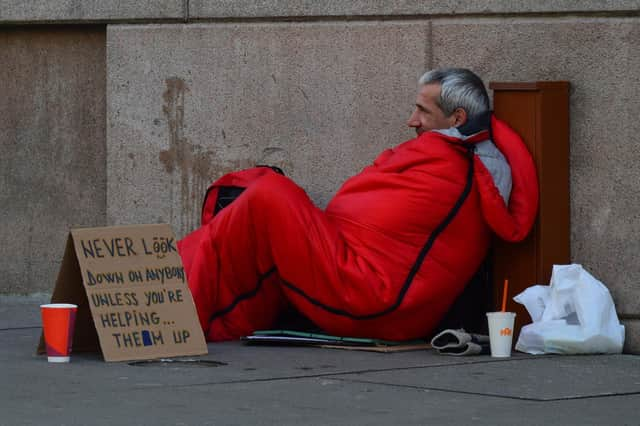Funding agreed for work to prevent homelessness across Nuneaton and Bedworth


The amount of money Nuneaton and Bedworth Borough Council will get from the government to help its work to help people avoid homelessness has been revealed.
Each year the government allocates Homeless Prevention Funding through what is now the Department for Levelling Up, Housing & Communities (DLUHC).
Advertisement
Hide AdAdvertisement
Hide AdThis year, on top of usual funding, an additional amount of £11,000 has been awarded to assist with new costs associated with Domestic Abuse Act obligations. In total, an amount of £358,868 has been allocated to the council for the financial year 2022-23.
The funding is used by the council to pay for various initiatives, including the salaries for additional staff that became a necessity following the Homelessness Reduction Act 2017, bond and rent-in-advance schemes, grants to support agencies - and for contributions towards the Rough Sleeper Hostel service.
With effect from January 2020 to date, the council's Housing Solutions Service has dealt with 3,061 applications from households that were homeless, threatened with homelessness, or considered that they may become homeless and seeking advice.
During 2021, 1,582 applications were made with 284 at pre-homelessness stage, of which 74 were prevented from becoming homeless.
Advertisement
Hide AdAdvertisement
Hide AdThe statistics showed that fewer people were approaching the council when they were at risk of becoming homeless, giving it adequate time to prevent homelessness occurring.
A council spokesman added: "This said, 2021 was a difficult year due to ongoing pandemic related issues such as financial and emotional stresses on families and individuals. The result was an increase in people being asked to leave lodgings with family and friends at very short notice. There was also an increase in domestic abuse and a general lack of alternative available housing options.
"From as early as March 2020, the service was also placed under additional pressure due to the ‘everyone in’ initiative in response to the pandemic, at its peak in the summer/autumn of 2020, this resulted in 148 households being in temporary emergency accommodation."
In 2018 the annual rough sleeper count for Nuneaton and Bedworth stood at 22 individuals. In November 2021, following three years of work with partner agencies and government funding for rough sleeping initiatives, this number has reduced to four.
Advertisement
Hide AdAdvertisement
Hide AdCabinet member for housing and communities Cllr Clare Golby,said: "Given the increasing demand for social housing, and diminishing supply from vacating tenants, homelessness continues to present a challenge to the council, and the focus on homelessness prevention is ever more important.
“Funding from the DLUHC helps us to fund initiatives like the Bond Schemes, and the private rented sector opportunities to address and reduce potential homelessness, as well as enabling access to alternative housing options to social housing.”
“From January 2020 to end of December 2021 the Housing Solutions Support Scheme secured private rented sector accommodation for 76 households, preventing them from homelessness.
“The council continues to work in close partnership with the county council, Public Health, police, probation, Doorway, P3, CGL, Together, local churches and faith groups, and other agencies working with vulnerable residents, to effectively and collaboratively prevent homelessness. The funding received from DLUHC is an essential resource that enables us to continually explore and initiate solutions to homelessness."